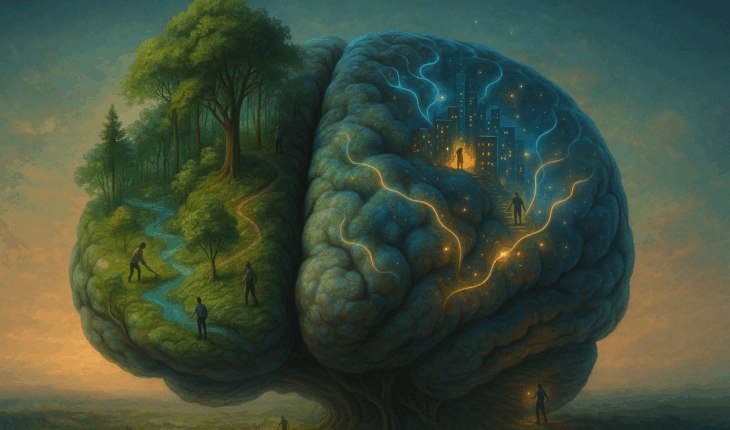The Double-Edged Mind
Human intelligence is often celebrated as our species’ defining triumph, the thing that built civilization, art, and science. But what if the same trait that set us apart also made us uniquely fragile? A recent article in New Science argues that our intellectual evolution carried hidden costs. The capacity to plan, imagine, and reflect—the very essence of human thought—also created the conditions for worry, fear, and self-conflict.
Our ancient ancestors benefited from foresight and imagination. Those who could anticipate danger, remember alliances, or craft tools survived. Yet as our brains grew more capable of envisioning the future, they also grew capable of dreading it. The mind that could predict tomorrow also learned to fear it.
From an evolutionary standpoint, this was an unavoidable trade-off. Intelligence helped us adapt to uncertainty, but it also magnified our sensitivity to it. Every breakthrough in self-awareness came paired with new forms of existential pain.
“The mind that can imagine the future must also learn to live with the weight of it.”
The “Mind Virus” Hypothesis
The New Science article introduces an intriguing idea: that the human mind is constantly infected and shaped by what it calls “mind viruses.” These are not literal pathogens but recurring cognitive distortions—patterns of thought that spread through imitation, language, and culture. Jealousy, confirmation bias, greed, fear of exclusion, and even tribalism all fit this pattern.
The article identifies thousands of such “viruses,” suggesting that they behave like psychological parasites that hijack attention and behavior for their own propagation. Yet there are also “healthy mind viruses”—ideas like compassion, patience, and critical thinking—that can counteract their destructive counterparts.
This framing borrows from evolutionary memetics, the study of how ideas replicate and compete in cultural space. It views mental health not as a fixed condition of the individual, but as a dynamic ecosystem of ideas evolving within each person.
The Social Brain Dilemma
Our intelligence did not evolve in isolation; it was born in groups. Living in tribes required tracking alliances, anticipating deception, and reading emotional cues. This “social intelligence” shaped the structure of our brains and our moral instincts.
But complex social cognition also introduced stress, comparison, and a constant awareness of status. Modern social media can be seen as a turbocharged version of this ancient arena, where every like, post, and comment plays on evolved instincts for recognition and belonging. The same neural circuitry that once kept us bonded in small bands now leaves us anxious in digital crowds.
Evolution’s Psychological Debt
The rise in anxiety, depression, and attention disorders may not be a sign that humans are “broken.” Instead, they could be the inevitable side effects of a brain designed for a different environment. Evolution equipped us to survive scarcity, not abundance; to find safety in small communities, not to process the endless noise of global connectivity.
In this sense, our mental health challenges might be viewed as the cost of cognitive overdevelopment. Intelligence is metabolically expensive as it demands immense energy and coordination. With that complexity comes instability. The same circuitry that enables creativity and empathy can spiral into overthinking or self-doubt.
Toward a More Conscious Evolution
The authors of the New Science paper suggest that our next evolutionary leap may be psychological rather than biological. Drawing on both neuroscience and ancient philosophy, they propose cultivating “cognitive hygiene” through mindfulness, rational compassion, and perspective-taking. Practices that reinforce the healthier patterns of thought.
They reference the Buddhist Eightfold Path as a secular framework for stabilizing the mind. In evolutionary terms, these habits act as social antibodies, countering destructive thought patterns before they replicate.
This approach reframes mental health as cultural evolution: the deliberate selection of ideas and practices that help us coexist with our hyper-intelligent minds.
An Evolution Still in Progress
From an anthropological lens, this idea resonates with a broader truth: human evolution never stopped. It merelyHuman evolution never stopped; it simply changed form. Our genes now evolve more slowly than our technology, language, and culture. The next stage of human progress may depend on how we manage the ecosystems within our minds.
Our intelligence gave us the power to shape worlds, but it also made us custodians of inner ones. If we can learn to balance brilliance with humility—and creativity with mental resilience—perhaps we can guide evolution itself with conscious intention.
The mind may have outgrown its environment, but it has not outgrown its potential for growth.shifted from genes to culture, from biology to behavior. Every tool, story, and idea we invent feeds back into the shaping of our minds. The next leap in human evolution may not come from mutations in DNA, but from the way we manage the interplay between intelligence and emotion.
We often think of evolution as a story of progress, but in reality, it is a story of balance. For every advantage nature grants, it extracts a cost. Our intelligence is no exception. It gave us the stars, but also sleepless nights beneath them.
Citation:
Lemaitre, A., & Van Dijk, R. (2025). Evolution of Human Intelligence: Psychological Science for a Better World. New Science, Vol. 12, Issue 4, pp. 34–47.
Retrieved from https://www.new-science.com/articles/evolution-of-human-intelligence




